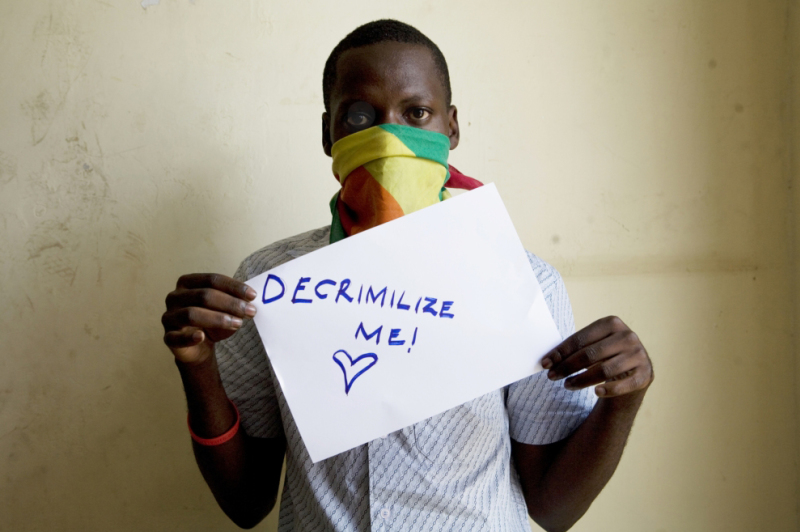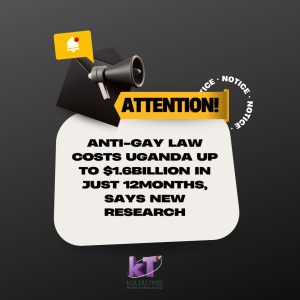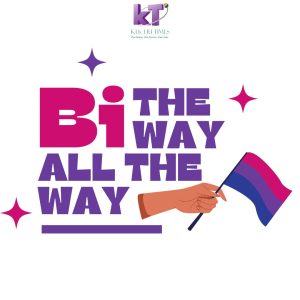Fred was only 17 years old when life took an unexpected twist. He was forced to leave his family home in Masaka after his parents disowned him for being gay. The fear of unsafety and desperation to survive drove Fred to Kampala with hopes of fending for himself. Without any friends, enough money to secure a meal or a roof over his head, life on the streets was terrible. Being under privileged only earned him odd jobs, carrying heavy loads over his shoulders for passengers to and from one prominent bus park in town. As time went on, Fred was influenced to adopt sex work through an acquaintance to enable him supplement on his meagre daily income. Even though it is viewed as a crime and one of the most dangerous trades in Uganda, to Fred, sex work has progressively turned into a profession rather than just any other job which makes him a statistic. Research studies by Avert (2017) show that while 36% of Men who have Sex with Men (MSMs) reported that they had regular unprotected anal sex with multiple steady and casual partners, 38% admitted to selling sex as a basic means of survival. Perhaps, this is the reason why male sex workers are often associated with the prevalence of HIV in Uganda.
Accelerated by homelessness, poverty and unemployment, some male sex workers confess that they first engaged in sex work while in their teens and continue to face several hurdles that deter their line of trade every day. The existence of punitive laws and negative attitudes of social stigma towards sex work makes it illegal. Aggravated by homophobia, male sex workers experience violations against them through brutal physical attacks, sexual assault, rape, blackmail, extortion and arbitrary arrests especially perpetrated by law enforcement authorities and clients. Some of these clients trick them into sex and disappear soon after without payment. Others are intimidated by threats to out them in public spaces for indulging in "illegal sex" if they insist on demand for their payment. Many male sex workers are unlikely to report such crimes to the police since barely any course of action will be taken to get them justice and would rather choose to endure in silence. Another challenge arises when their clients promise to pay more money for raw sex without using condoms. The urgency to meet their essential daily needs doesn't leave any room to bargain or negotiate which puts them at risk of contracting HIV/ STDs. In rural areas, there is limited access to free or affordable condoms and suitable lubricants which leads to inconsistent condom use among the male sex workers and their clients. Last month, the Ministry of Health during a stakeholders meeting announced plans to scrap off MSMs and transgender persons from its data systems. If this is implemented, it will isolate male sexual minorities and the transgender community from national health programs, facilitate discrimination and hinder their access to health care.
Several male sex workers argue that sex work alone cannot sustain them. While most MSM organizations have done a commendable job towards the reduction of HIV rates and improved access to health care for male sexual minorities, they should incorporate legal and economic empowerment strategies that can contribute to safety and personal development of male sex workers respectively. This will further improve the quality of their lives since they won't have to entirely depend on sex work to make ends meet. Even though it is agreeable that emphasis on the consistent condom use and recommendation of PREP should continue in urban centers, the same relentless efforts should also be made towards sensitization of safe sex among MSMs and male sex workers in rural areas through increased access to information as well as condom and lubricant distribution. The government of Uganda through Ministry of Health should persist with the integration of MSMs and other gender/ sexual minorities in national health programs to ensure the right to health for all Ugandans without any form of discrimination. Lastly, Human Rights Activists should not falter in their commitment to advocate against the draconian laws and cultural norms that trigger societal biases against sexual and gender minorities and hence will minimize violations towards the whole LGBTI community in Uganda.




